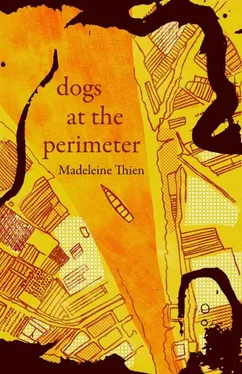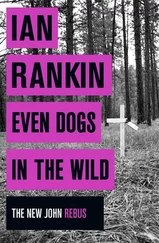Jambavan was lying on my pillow. Kiri’s cat watched me lazily. I liked her company. I remembered the day we brought her home, this tiny kitten who loved to nestle inside Kiri’s sock drawer. Around the apartment, my son would crawl like a maniac, sputtering, “Jambajambajamba.” Navin said, “Sounds like a Latin dance.” The name had been my idea, Jambavan, the king of bears, a hero of the Ramayana, the epic that, in Cambodia, we called the Reamker.
My son scratched at the door. “Can I make you dinner?”
“I love you, Kiri,” I said. I could hear him sobbing for what felt like hours, and the sobbing was like a coat of skin that I wore, that I couldn’t remove.
Navin came home to this wreckage and still he forgave me.
I wanted to tie my son’s wrist to mine with a piece of string and in this way save us both. It’s in the night, I know, that the ones we love disappear. Once, when I was ten years old, Kosal, the head of our cooperative, had given me the clothes of another girl. He told me to wear them out into the fields. Later on, when I undressed in the half-light, I saw that blood had seeped through the fabric and marked my skin, it covered my chest and my thighs. I remember the sound of water, my mother scrubbing the clothes over and over. I remember she scrubbed so hard the black dye came off in streaks. We wrote the girl’s name on a piece of bark and buried it in the earth. My mother prayed for life. I looked at the sky, at the trees, at the disturbed mound of earth and saw no possible gods.
While Navin slept beside me, I fought to contain my thoughts. In my dreams, I saw everyone and everything, but never my mother, never Sopham. The Khmer Rouge had taught us how to survive, walking alone, carrying nothing in our hands. Belongings were slid away, then family and loved ones, and then finally our loyalties and ourselves. Worthless or precious, indifferent or loved, all of our treasures had been treated the same.
Outside, I am surrounded by tiny sequins of snow. I walk downhill on University Avenue, toward Café Esperanza, where inside, the heat welcomes me. The owner is washing the laminated menus, vigilantly, as if polishing fine silverware. He grimaces out the window at a man in yellow overalls, harnessed to a complicated system of belts and clasps, floating above the traffic. The man is part acrobat, part city worker, repairing the wires. The orange light of his truck spins over us like quiet laughter.

In fits and starts, Hiroji tells me what has happened. It is March, not quite a year ago, nighttime, and we are sitting in his apartment.
On his way home from the BRC, Hiroji says, passing by Café Esperanza, he glimpsed an older Japanese man, moving slowly, dressed in a raincoat, with neither hat nor gloves. For a brief moment, the man looked at him. A shock of recognition stopped Hiroji where he stood. How could such a thing be possible? But there was no mistaking it.
The Japanese man was in his mid- to late sixties. His once-dark hair was now completely grey and there was a line, a scar, running from the corner of his right eye across his cheek. By the look of it, an old injury. He had the same high forehead, Hiroji said, and slight, dark eyes, but his body had gone brittle and crooked. His jacket was far too thin and the scarf he wore was ineffectual, open at the neck and hanging loose like an unknotted tie. Hiroji stared at the stranger and he knew, instantly, that it was his brother. That it could not be his brother. And yet, that it was.
“Wait,” the man said. “I know you.”
“Ichiro,” Hiroji said. Cold air caught in his lungs. “James.”
“You remember! It’s astonishing. Come have supper with me.”
“Tonight? But I have plans.” Hiroji hardly knew what he was saying. The older man seemed insubstantial, a reflection of a reflection.
“Just a coffee, then. Please. We must, after all these years.”
In the distance was an electric sign flashing sharp red digits. He could just make it out: nearly five in the afternoon, minus 22 centigrade. Hiroji felt his legs beginning to give way. “All right. Just a coffee.”
They passed through the doors of Café Esperanza. On the counter was a cake stand with a glass cover, inside of which curled a half-dozen croissants. Hiroji bought them all and, at first, the older man, ravenous, ate without speaking. He dipped the croissants one by one into his bowl of café au lait until the serving plate held only crumbs. Then he licked the tip of his index finger, pressed it to each of the remaining flakes, and ate those too.
“You eat croissants just as the Parisians do,” Hiroji said.
The man looked up, crumbs on the corners of his mouth, pleased, almost childlike, at the thought. “Maybe I was one. Maybe that’s who I was, in my other life.”
In the warm interior light, the man looked younger. He smiled in a way that seemed giddy and unfamiliar.
“Forgive me,” Hiroji said, embarrassed. “I’m very sorry, but I can’t seem to remember how we met.”
“I thought you knew me! You said my name.”
“You seemed familiar to me.”
Upset, the man began to ramble. He was soft-spoken, and Hiroji had to lean forward to catch all the words. The man described waking, suddenly, on the wet ground, his entire body convulsed with pain. Things were broken, blood was sticky on his fingers, but he couldn’t remember why, he didn’t know how this had happened. For hours, maybe days, he had walked in a dream, not comprehending how things moved in the world. Cars hurried down on him. There were too many voices speaking too many languages and he didn’t know which one belonged to him. His stomach hurt and his legs felt empty, but he didn’t know that this hollowness was hunger. He had no memories, no thoughts, no ideas, nothing. Everything had been taken away, that much he understood, but by whom and when did it happen? He walked to the middle of the Pattullo Bridge and stood there for a long time and the river kept flowing, he saw timber bobbing on the surface, log booms and log traffic, a gull standing on a bit of rope, and he had the sensation that both sides of the river were tightening like a vise. Someone had tricked him, someone had come in the night and robbed him of his possessions.
“I got up on the railing,” he told Hiroji. “I looked at the world and I thought, What now? What happens now? I wasn’t angry. I just wanted to stand there and ask my question. I wanted someone to acknowledge me.”
He stared up at the lights of the café, wild-eyed.
The man was starving. Hiroji caught the waitress’s attention and asked if there was any more food to be had. The girl was young and she gazed at them with curious eyes. She returned with a few slices of bread, an enormous hunk of cheese, and a little dish of jam. “The owner’s fridge,” she said. “But he won’t be back until after the weekend.”
The man ate intently.
“Someone found you and brought you to the hospital,” Hiroji said. He had a glimmer, now, of a patient he had long forgotten.
The man swallowed the bread that was in his mouth. He reached for a water glass that wasn’t there, then let his hand rest limply on the table. “The others called me John. Johnny Doe. That was unkind, wasn’t it? A name that shouts that no one’s home. Useless. You called me James.”
“But it was long ago, wasn’t it?”
The man smiled. “You’re asking me? That seems a problem, Doctor. Did you fall and hit your head too? It must be thirty years at least.”
“I remember that we discharged you.”
“I’ve done all the tests: PET, SPECT, fMRI, EEG. Even a polygraph, in case I was just a liar.” He picked up a piece of bread, wiped it in the remaining jam, and then added the last rectangle of cheese. “I met a woman from St. John. I met her at the theatre. She invited me to her house for a visit. I could make it there tomorrow but I have no money for the bus.”
Читать дальше













